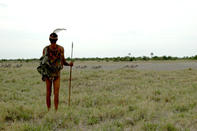From Followers to Controllers
The world we live in today is unlike anything our species has known before. For most of our human experience, we followed where our food went. If the herds migrated, we packed our things and trekked after them.

We took our cues from the seasons, going where the trees pushed out plump fruits or traced the fires that would send out new grazing. It was a fragile world, a boom-or-bust existence. When there was plenty, we gorged ourselves; when there was nothing, we waited out the famine.
The need to control that boom-or-bust economy of our food has driven so much of our technological development over the past 12 000 years. Now, we control food as never before, in a way that largely removes so much of the uncertainty about whether we will have enough food tomorrow or not.
We produce massive surpluses that can tide us over through the hungry season - the months of famine between last season's harvest running out and this season's crops ripening. We can store food for longer, ship it further and even transform it into varieties that our grandparents would not recognise, think Twinkies, Coco Pops, Chicken McNuggets.
Rethinking the Global Food System for Massive Populations
This is partly why our cities have been able to grow as big as they have. With so much food coming in off our fields and out of our orchards, and with farmers and transporters and food-processing lines and retailers able to ship, transform, package, chill and sell our food in such large quantities, across such great distances, it has freed up so much of the world's populace to use their time for pursuits other than growing their own food.
By the time we slipped from wandering hunter-gatherer to farmer, there were about 4 million people on the planet, and no major cities. Today, there are a staggering 7 billion people on the globe, half of whom have been living in and around the world's cities since 2007. By the middle of this century, there will be 9 to 10 billion people in total, and well over half of those will be city dwellers.
Feeding them is going to require considerable innovation and rethinking of the global food system, particularly since it has evolved over the past 200 years to be a high-yielding but energy-intensive and massively polluting business. Producing, packaging, shipping, storing, cooling and selling food for that number of people needs a lot of oil for fertilisers and fuels, plenty of water and soil, and atmospheric space to mop up the resulting carbon emissions.
There has been a shift in global geopolitics and in our relationship with the energy sources that have allowed us to get so big, both in population size and technological advancement.
We are finally waking up to the fact that our industrialised world is changing our climate irrevocably and pushing us towards a set of environmental conditions that are outside anything in which today's species evolved, or in which the bulk of modern human innovation and development happened.
And we are running out of cheap, easy-to-reach oil. This means the model upon which the modern industrial food system has been built is about to start crumbling around us.
A System Making Us Sick
When we first began tilling the land about 12 000 years ago, trying to wrestle our wild foods out of the capricious hands of nature, we were eating the kinds of foods that millions of years of evolutionary process handed to us.
Today, we are growing bloodless meat in laboratories, we are splicing different species' genes into the genetic weave of plants, we are breaking down foods into their constituent nutrient parts and putting them back together again but into commodities that are almost unrecognisable compared to their source material.
We have achieved extraordinary things in our attempt to control the food economy and save ourselves from the horror of going hungry. And in the process, we have created a system that is making us fat and sick. Our food economy has become a megalith built on a tottering foundation of environmental decay and over-extracted resources.
By Leonie Joubert